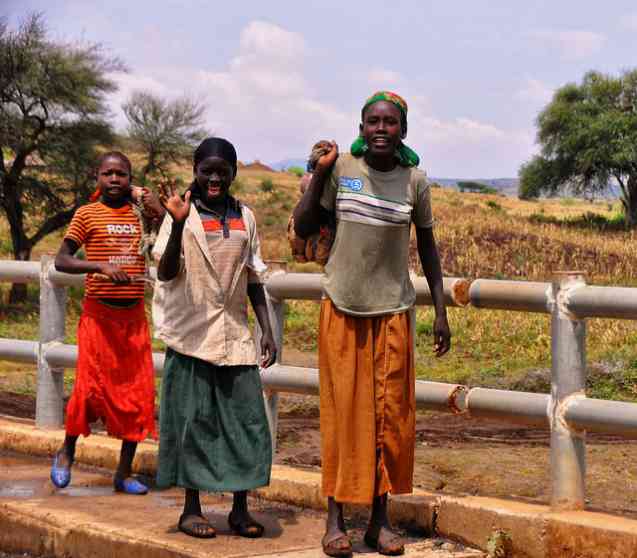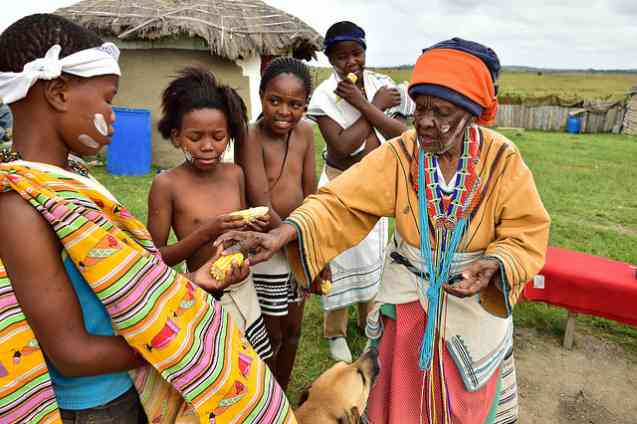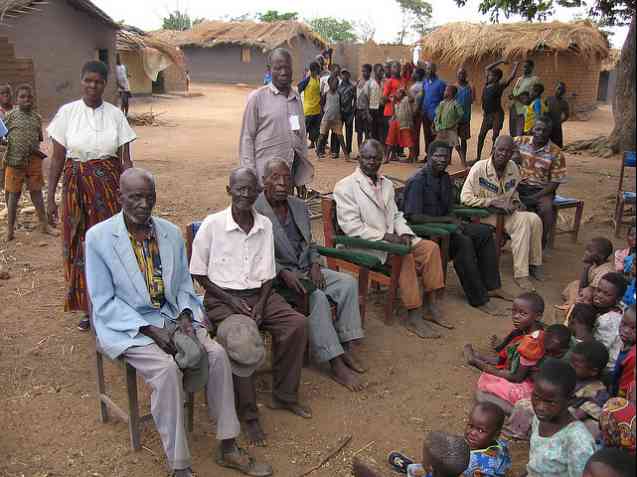African Culture Highlights: 7 Fascinating African Traditions
Africa is a smorgasbord, not only of wildlife and spectacular scenery but of people, and their customs. African culture is intriguing, with all our different African tribes and traditions, each one more awe-inspiring than the last!
Africa is a very large continent, with a huge number of people divided into lots (and lots) of different groups and African tribes, each with its own cultures and traditions. This melting pot of people is one of the many reasons that Africa is such a wonderful and fascinating place. In this blog, we look at just several of the customs found in African culture.
Please remember that each area and each area's inhabitants have different customs and etiquette. To minimize the risk of a faux pas and ensure that you respect local culture, ask around if you’re unsure about how to handle any social situations. One thing all Africans have in common is a welcoming and friendly demeanour!
1. African Handshakes
Many people from Europe greet each other with kisses on the cheek – some once, others up to four times, alternating cheeks. In African culture, we generally shake hands. And by that, we don’t mean just a boring old ‘clasp hands, shake, separate’. No, we do things in a way more interesting fashion. Watch the video above, for just one example.
African culture comes with some wonderful points, one of the main ones being respect. When shaking hands, the other hand is placed on the upper arm as a display of that respect.
2. Speaking Loudly in African Culture
 African culture, walking and chatting by Rod Waddington
African culture, walking and chatting by Rod Waddington
In many African cultures, you talk loudly. This is not in order to irritate those around you; it is to ensure that nobody thinks secrets or gossip are being whispered to each other. Again, this is a sign of respect for people.
It’s also one of the wonderful things about Africa – busy and bustling and loud!
3. Dancing in Africa
 Culture of African dancing by David Stanley
Culture of African dancing by David Stanley
In Africa, we dance for everything. Getting married? We dance. Coming of age? We dance. Friday night? We dance. Funeral? We dance. Yip, you read that right. The rhythm of Africa runs through pretty much every aspect of African culture.
There is nothing that stirs the soul more than the beat of an African drum and the dust stirred up by dancing feet.
Again, each person and each occasion has a different dance and music style. When on safari, try to see (and do) as many as possible – they’re awe-inspiring. These are just two of the many:
Maasai Warrior Dance (East African Culture)
 Maasai warrior dance, East Africa by Harvey Barrison
Maasai warrior dance, East Africa by Harvey Barrison
This jumping dance, called adumu, is traditionally performed during the coming-of-age ceremony when boys become men/warriors. Unlike most other African cultures, the Maasai don’t routinely use drums, but dances are accompanied by vocals only.
The warrior dance is spectacular, with the warriors standing in a circle, entering the middle one at a time, and jumping, as neatly and high as possible, without the heels touching the ground. The ones who jump highest are deemed the strongest, and get the girls!
The Maasai people are primarily found in Kenya and Tanzania.
Gule Wamkulu (Malawi Culture)
The Gule Wamkulu is a dance performed at initiation ceremonies, funerals, and celebrations of the Chewa people in Malawi. It is performed by members of Nyau, a secret society of men thought to have been established as a counterpoint to the matrilineal society of the Chewa.
Dancers wear elaborate masks, often animals, and kick up dust in order to keep their identity secret. The dance is considered to be a communication with the ancestors.
4. Lobola (South African Culture)
 Eastern Cape culture, South Africa by South African Tourism
Eastern Cape culture, South Africa by South African Tourism
Traditionally in many tribes of Africa, a groom must ‘pay’ the family of his bride-to-be. This payment – called lobola in South Africa – in days gone by (and still now, in rural areas), takes the form of cows. Nowadays, if this payment is paid, it is generally in cash.
Before a wedding, the groom meets with the bride’s elders and between them, they agree on a price.
5. Nyami Nyami River God (Zimbabwe Culture)
 Nyami Nyami African traditions by Jason Wharam
Nyami Nyami African traditions by Jason Wharam
Anybody who visits Victoria Falls (and the rest of Zimbabwe) will have come across the Nyami Nyami river god. Known as the protector of the Tonga people, he and his wife lived in the Kariwa Gorge of the Zambezi River, before Kariba Dam was built.
With the body of a snake and the head of a fish, the Nyami Nyami is found carved in wood and bone as pendants, walking sticks, and various other trinkets at markets and curio shops. Many wear it around their necks to protect them, especially those working on or around the Zambezi River.
It is believed that the building of the Kariba Dam angered Nyami Nyami, as it flooded his home and separated him from his wife. The building of the dam was fraught with disaster and flooding, and still, there are earth tremors in the area. Scientists blame the changing landscape due to the dam, but others say it’s the angry Nyami Nyami.
6. Himba ‘Sun Block’ (Namibia Culture)
 Mother and child, African tribes by David Siu
Mother and child, African tribes by David Siu
The beautiful red/orange tone seen on all Himba women living in the Kunene region of Namibia is due to a paste applied every day. It is made up of powdered ochre mixed with butter.
It is used only by the women of the tribe, who apply it daily to the skin and hair, for both cosmetic and more practical reasons – it acts as a sunblock and protects against the incredible heat of the desert.
7. Family Traditions & Ancestors
 Mama Tofu, Qunu, African culture by South African Tourism
Mama Tofu, Qunu, African culture by South African Tourism
There is nothing more important in African culture than family. In most tribes, ’family’ is not considered to just be immediate family, as in the Western world, but includes the extended family – aunts, uncles, cousins, etc. Ancestors are also important.
Most importantly, though, and one of the traits that the Western world could take a few lessons from, is the respect given to the elders in the family. Big decisions involving any member of the family usually require a meeting of the elders.
Any important occasion is celebrated with the whole family, so African celebrations tend to be large and noisy!
A predominant belief throughout sub-Saharan Africa is that of the spirits of the ancestors. Huge importance is placed on appeasing them. It is believed that once a person dies, they continue to be interested in, and influence, the lives of their families.
Many of the traditions, dances and ceremonies still practised in African culture are done so as a means of communicating with the ancestors. They are relied on for guidance.
 Meeting of the elders, African traditions by khym54
Meeting of the elders, African traditions by khym54
These are just a few of the wonderful traditions that make Africa the unique and fascinating place that it is.
Several of our African safaris include cultural tours and experiences in South and East Africa, from Ethiopia and Rwanda to South Africa and Botswana. See below for some of our recommended African safaris that include memorable cultural travel experiences.
Get hold of one of our ABS consultants and book your African safari to come and experience African culture for yourself!
If you liked this post, these trips cover similar ground…
- 13 Day South Africa Safari & Eswatini Tour
- 4 Day Cape Town Tour - Winelands & Culture Package
- Authentic Ethiopia Cultural & Wildlife Tour
- Cultural Ethiopia Tour
- Budget Ethiopia Cultural Tour of Omo Valley Tribes
- Rwanda Gorillas, Wildlife & Cultural Tour
- Kalahari Desert Botswana Safari (Camping)
- Kalahari Bushmen, Okavango Delta & Savuti Safari in Botswana


 Briony is a qualified pharmacist, published author and travel blogger living in Cape Town. She writes her own blog about travel, the arts, music and the good things in life, with a focus on accessibility. She likes watching the world go by, and sometimes it makes her nose twitchy, but mostly it provides golden nuggets with which to light up the page.
Briony is a qualified pharmacist, published author and travel blogger living in Cape Town. She writes her own blog about travel, the arts, music and the good things in life, with a focus on accessibility. She likes watching the world go by, and sometimes it makes her nose twitchy, but mostly it provides golden nuggets with which to light up the page.







